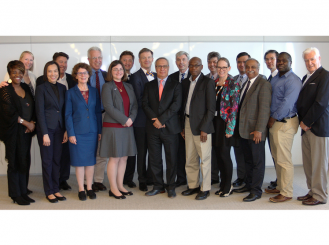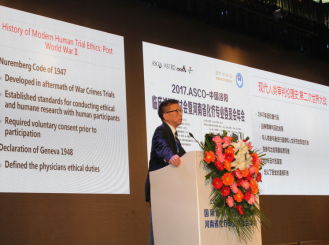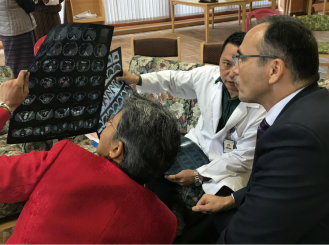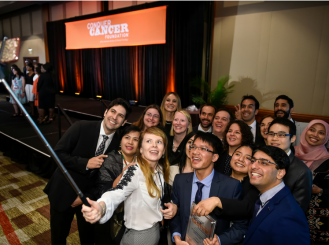Feb 01, 2018
In late 2016, ASCO announced further expansion of its robust portfolio of international programs. As we prepare for World Cancer Day 2018 on February 4, we would like to take some time to review what we accomplished in 2017.
All of these accomplishments reflect the hard work and commitment of many ASCO member volunteers, ASCO staff, and organizations around the world. We are truly a global community, working together to improve cancer care around the world.
Our Mission
ASCO International is designed to harness ASCO’s core strengths in education and oncology practice to deliver programs with impact in the following areas:
- Improving quality of care—working with organizations and hospitals to extend oncology skills and knowledge
- Accelerating innovation and research—deepening the skills of investigators, particularly in low- to middle-income countries
- Supporting professional development—mentoring future leaders in oncology and providing career development for early-career oncologists in low- to middle-income countries
The past year saw real accomplishment in each of these areas.
I. Improving Quality of Care
Education and training are at the core of ASCO’s efforts to improve the quality of cancer care around the world. In all, ASCO International organized 11 courses in 2017, training physicians, nurses, and other health care professionals in Multidisciplinary Cancer Management Courses (MCMC), International Palliative Care Workshops (IPCW), International Clinical Trials Workshops (ICTW), and other courses that improve the quality of cancer care. In 2017, 84% of respondents to the onsite evaluations at the MCMC courses in Morocco, Nigeria, and the Philippines reported planned changes in practice; at the ICPWs in Indonesia and Morocco the average was 93%. In the ICTW courses in Uruguay, Greece, Russia, and China, the average was 82%.
Many of our training programs extend beyond the oncology community. In 2017, we held two Cancer Control in Primary Care (CCPC) courses, working with governmental authorities, local organizations, and ASCO members to engage primary care providers in cancer control. The courses were held in Nigeria and Bhutan. Remarkably, 100% of respondents to the onsite evaluations for CCPC courses held in 2017 said they intended to make practice changes based on what they learned in the course. Responses to the 1-year evaluation for the 2016 CCPC were also promising: 93% of respondents to the 1-year follow-up said they had made practice changes, and 73% said they were screening patients for cancer more than they did before the course.
Our education and training efforts are also done at the hospital level, through our International Cancer Corps program with Health Volunteer Overseas. In 2017, we began activity in our newest site: Kathmandu, Nepal. Volunteer visits there are helping to support a new medical oncology residency program at Bir Hospital by doing hands-on training with the residents and oncology staff, and we have also had volunteers do training in surgical and gynecologic oncology at Bhaktapur Cancer Center. Our other ICC sites include Bhutan, Honduras, and Vietnam. Please check ASCO.org to learn more about how to volunteer.
In 2017, our goals were even more ambitious. We joined the Union for International Cancer Control (UICC) in launching the City Cancer Challenge (C/Can), focusing on improving access to care in select cities in low- and middle-income countries. C/Can will address the urgent need for fully functional, comprehensive cancer solutions in urban areas, with a focus on cities with a population of more than a million. The first four cities who have committed to C/Can are Asunción, Paraguay; Cali, Colombia; Kumasi, Ghana; and Yangon, Myanmar. These “key learning cities” will provide insight on how the international community, local civil society, and the public sector can best work together. Already, ASCO and its member volunteers have contributed technical assistance to the program, as C/Can conducts intensive needs assessments with municipal authorities in each of the cities. These assessments will generate prioritized to-do lists, which will then be the plan of action for ASCO and other international organizations to contribute programs and resources. C/Can is just one of many ways that ASCO is achieving global reach.
To support quality of care measurement, in 2017 ASCO made significant progress in making its quality programs more accessible to practices outside the United States. By the end of 2017, 15 new international practices registered in ASCO’s Quality Oncology Practice Initiative (QOPI®), with over 50 international practices registered from Argentina, Australia, Brazil, Greece, India, Italy, Philippines, Romania, Saudi Arabia, Spain, and the United Arab Emirates. In September, three Spanish practices received QOPI® Certification during the European Society of Medical Oncology (ESMO) 2017 Congress in Madrid, Spain. In 2018, we are introducing new extended abstraction rounds. The 2018 QOPI Round 1 data abstraction will open February 20, 2018, and close June 1, 2018. QOPI will also offer participants several new and updated tracks (formally called pathways) for 2018, including the “New to QOPI Track”—an easy way for practices who are participating in their first round to familiarize themselves with QOPI Reporting. You can now register for QOPI by selecting “New Registration.”
The ASCO Medical Oncology In-Training Exam effectively identifies areas of strength and weakness in individual oncology training programs, assesses trainee knowledge, establishes educational standards across training programs, provides a tool to improve training, stimulates intra-programmatic reading and discussion, and provides feedback to individual trainees regarding their strengths and weaknesses. The exam is web-based, enabling trainees to take the test at their home institutions in a proctored environment. We have seen increased participation internationally, with 27 countries and 194 trainees participating outside the United States.
ASCO also offers Education Essentials for Oncology Fellows (EEOF), a bundled package of ASCO University® content offered at a discounted price for oncology fellows/trainees enrolled in an oncology training program in the United States or in an equivalent program internationally. ASCO believes every oncology trainee is entitled to high-quality educational materials; discounted pricing is available for programs in a country classified as low- to middle-income according to the World Bank.
Guidelines are another important tool in the delivery of quality cancer care, and in 2017 ASCO published its third resource-stratified guideline on cervical cancer in the Journal of Global Oncology (JGO), on the primary prevention of cervical cancer. In addition, ASCO is developing three new resource-stratified guidelines on palliative care, early detection of colorectal cancer, and the treatment of patients with early colorectal cancer. The guideline expert panels met in 2017, with the expectation of publishing in 2018.
Lastly, in 2017 ASCO expanded the existing Global Oncology Symposium at the Annual Meeting to an entire 15-session Global Health education track. Highlights included sessions on Global Health Initiatives of the International Oncology Community; Recognizing Global Oncology as an Academic Field; Alternative Approaches to Prevention, Early Detection, and Implementation in Global Health; and Prevention, Diagnostics, and Treatment of Lung Cancer in Low- and Medium-Resource Countries. Topics are still under development for 2018, but a preview of sessions includes International Perspectives on Breast Cancer, Global Access to Essential Cancer Medicine, and International Translation of Quality Oncology Care Measures and Standards. We look forward to seeing you at the Annual Meeting!
If we can’t see you in Chicago, we try to bring the science of the Annual Meeting to you. In 2017 we held 28 Best of ASCO® meetings internationally, and we also held several licensed live meetings covering the Annual Meeting in Belgium and Genitourinary Cancers Symposium in Austria, Belgium, Brazil, Germany, Japan, Netherlands, Switzerland, UAE, Turkey, and Saudi Arabia.
II. Accelerating Innovation and Research
ASCO’s Conquer Cancer Foundation has been instrumental in providing research grants to recipients in low- and middle-resource countries.
ASCO and Conquer Cancer were pleased to announce a new grant in 2017, the Global Oncology Young Investigator Award. This award is a 1-year grant that provides research funding to early-career investigators to encourage and promote quality research in global oncology and to develop the next generation of researchers to address global health needs. The inaugural recipients will be announced at the 2018 ASCO Annual Meeting.
In 2017, Conquer Cancer awarded four International Innovation Grants to the following investigators:
- Saul Campos Gomez, MD, MSx, Centro Oncológico Estatal ISSEMYM, Mexico; “Remote management of oral chemotherapy: development and assessment of an e-tool for adherence and management of toxicities for a Mexican Public Health System”
- Tonia Onyeka, MBBS, University of Nigeria Enugu Campus; “Enhancing palliative care in rural south-east Nigeria: use of an app for symptom management”
- Raya Saab, MD, American University of Beirut Medical Center, Lebanon; “Targeted education for general practitioners with development and application of a workflow for rapid second opinion, to promote early diagnosis and referral of children with suspected solid tumors”
- Liliana Vasquez, MD, AMEROM, Peru; “ONCO-PEDS (Pediatric Early Diagnosis System): a novel mobile application for early diagnosis and referral in childhood cancer”
In 2017, ASCO’s support for research in these settings was further enhanced with the Journal of Global Oncology (JGO), an online, open-access journal focused on cancer care, research, and care delivery issues unique to countries and settings with limited health care resources. The hard work and findings of the International Affairs volunteers and staff were featured in two JGO articles this year: Results of Cancer Control Education for Primary Care Providers in Low- and Middle-Income Countries and American Society of Clinical Oncology’s Global Oncology Leadership Task Force: Findings and Actions. In 2017, JGO received 250 submissions from over 50 countries. In addition, all manuscripts published in JGO are deposited to PubMed Central and are discoverable on PubMed and MEDLINE via the PubMed Central repository.
ASCO’s first clinical trial, the Targeted Agent and Profiling Utilization Registry (TAPUR™) Study, has been very successful, with over 100 U.S. sites participating and over 600 patients on study. The Netherlands Cancer Institute (DRUP) and Canadian Cancer Trials Group (CAPTUR) are conducting simultaneous global trials, and the WIN Consortium is also developing a version of TAPUR. Chief medical officer Richard L. Schilsky, MD, FACP, FASCO, launched ASCO’s new research hub in January 2017, as a way to conquer cancer by generating, integrating, analyzing, and sharing oncology data to foster innovation in research and patient care. Through the Center for Research and Analytics (CENTRA), requests can now be made for data from a variety of ASCO sources such as quality programs, the annual census of oncology practices, scientific meeting abstracts, and the TAPUR Study (following initial publication).
III. Professional Development
Supporting the professional development of future oncology leaders, particularly in parts of the world where such opportunities are limited, is a key component of ASCO International programs.
2017 saw our first group of ASCO Virtual Mentors and Mentees participate in this exciting new educational program. The program pairs early-career ASCO members with mentors who then communicate via email, phone, and video conferencing. We had 12 mentee/mentor pairs representing participants from 11 countries in 2017. If you would like to be involved as a mentor, you can visit the Volunteer Portal to apply to be a volunteer—selecting the “International” interest box will register your interest in Virtual Mentors and other ASCO International programs. Applications for our 2019 Virtual Mentor Program will open later this year.
In 2017, ASCO and Conquer Cancer celebrated the 15th anniversary of the International Development and Education Award (IDEA)—pairing young oncologists in low- and middle-income countries with senior ASCO member mentors. In honor of IDEA’s milestone year, we took a look back at the original formation of the award and recognized this year’s IDEA and IDEA-Palliative Care (PC) recipients. The IDEA program remains a cornerstone of our portfolio, not only in terms of achieving its own goals (95% of 2016 recipients who responded to the follow-up survey reported implementing their action plans one year after getting the award, for example) but also in terms of supporting each of our other programs; past recipients of the IDEA award are now organizing ASCO courses, advising us on other international programs, and serving on committees and working groups. For instance, IDEA-PC recipient Diah Martina, MD, organized an IPCW in her home country of Indonesia.
The 2017 Long-term International Fellowship (LIFe) recipient was Susmita Sharma, MD, from Bir Hospital, NAMS, Nepal. She was also a 2016 IDEA recipient.
International participation in ASCO’s prestigious Leadership Development Program (LDP) remains strong. In 2017 Shaheenah Dawood, MBBS, FACP, FRCP, of the UAE, was accepted to the program.
In Conclusion
ASCO continues to grow and evolve as a society with a global mission, sustained by a global community. We hope this overview of the highlights of 2017 helps to illustrate how this evolution is taking shape, and the real impact it is having on the worldwide oncology community. Thank you once again for your support and interest in ASCO International and our work together.




